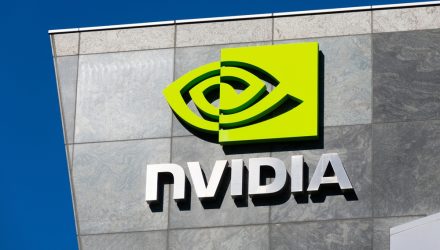It’s widely known that Nvidia (NVDA) isn’t just a semiconductor behemoth, it’s one of the world’s largest companies of any stripe. That status has been facilitated in part by the firm’s dominant perch in the realm of artificial intelligence (AI) chips.
That’s been a boon for exchange traded funds such as the Invesco PHLX Semiconductor ETF (SOXQ). IThe fund tracks the widely observed PHLX SOX Semiconductor Sector Index. It allocates 10.64% of its roster to Nvidia, making the stock the ETF’s largest holding.
Nvidia could be bring more of its AI chip production to the U.S. Other companies residing in the ETF could follow suit. They have good reason to consider such moves. During the worst days of coronavirus pandemic, global supply chains proved fragile. Plus, Taiwan – home to foundry giant Taiwan Semiconductor (TSM) – could be an epicenter of negative geopolitical activity if China instigates conflict there.
AI, Reshoring Could Boost SOXQ
AI is a clear catalyst for SOXQ. It has contributed to a nearly 67% gain for the ETF over the past 12 months. Some market observers believe prior estimates for chip demand tied to AI are likely to prove too conservative.
“In January, Deloitte projected that global semiconductor chip sales, led by AI chips, would grow 13% in 2024 to the highest level on record. The market for AI chips has grown from close to zero in 2022 to a projected $50 billion in 2024, and by 2027, it could account for half of the entire chip market,” reported Jakob Zinkula for Business Insider.
Due to domestic jobs growth from the semiconductor industry, companies — including SOXQ member firms — may see those roles increase. The Semiconductor Industry Association noted U.S. universities educate more than 100,000 masters-level semiconductor professionals each year. They ultimately return to their home countries instead of remaining in the U.S.
AI could be helpful regarding removing the red tape that hampers more chip production facilities in the U.S.
“ … it appears the buzz around generative AI — and the surging demand for chips that power it — is turning things around. This could benefit a variety of US companies in the chip production supply chain. [It] could provide more jobs for Americans, and help the US bring chip production closer to home,” according to Business Insider.
For more news, information, and analysis, visit the Innovative ETFs Channel.








